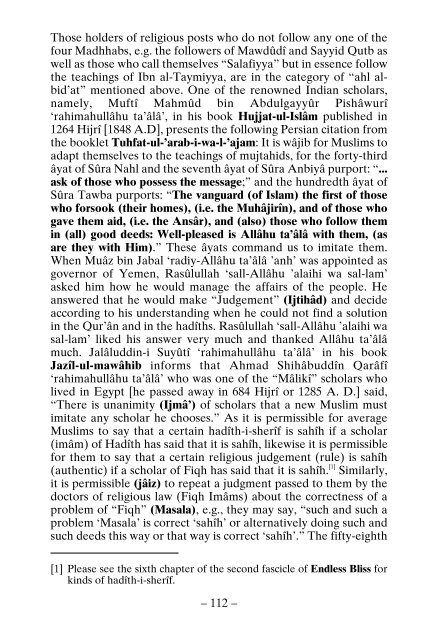Ethics of Islam
Ethics of Islam is taken from the book Berîka by Muhammad Hâdimi. Immorality and ways to get rid of it; 40 depravities and cures to them; usefulness of ethics; what is a soul; strengths of a soul; Personalities emanating from wisdom, courage, chastity and justice are extensively explained.
Ethics of Islam is taken from the book Berîka by Muhammad Hâdimi. Immorality and ways to get rid of it; 40 depravities and cures to them; usefulness of ethics; what is a soul; strengths of a soul; Personalities emanating from wisdom, courage, chastity and justice are extensively explained.
You also want an ePaper? Increase the reach of your titles
YUMPU automatically turns print PDFs into web optimized ePapers that Google loves.
Those holders <strong>of</strong> religious posts who do not follow any one <strong>of</strong> the<br />
four Madhhabs, e.g. the followers <strong>of</strong> Mawdûdî and Sayyid Qutb as<br />
well as those who call themselves “Salafiyya” but in essence follow<br />
the teachings <strong>of</strong> Ibn al-Taymiyya, are in the category <strong>of</strong> “ahl albid’at”<br />
mentioned above. One <strong>of</strong> the renowned Indian scholars,<br />
namely, Muftî Mahmûd bin Abdulgayyûr Pishâwurî<br />
‘rahimahullâhu ta’âlâ’, in his book Hujjat-ul-Islâm published in<br />
1264 Hijrî [1848 A.D], presents the following Persian citation from<br />
the booklet Tuhfat-ul-’arab-i-wa-l-’ajam: It is wâjib for Muslims to<br />
adapt themselves to the teachings <strong>of</strong> mujtahids, for the forty-third<br />
âyat <strong>of</strong> Sûra Nahl and the seventh âyat <strong>of</strong> Sûra Anbiyâ purport: “...<br />
ask <strong>of</strong> those who possess the message;” and the hundredth âyat <strong>of</strong><br />
Sûra Tawba purports: “The vanguard (<strong>of</strong> <strong>Islam</strong>) the first <strong>of</strong> those<br />
who forsook (their homes), (i.e. the Muhâjirîn), and <strong>of</strong> those who<br />
gave them aid, (i.e. the Ansâr), and (also) those who follow them<br />
in (all) good deeds: Well-pleased is Allâhu ta’âlâ with them, (as<br />
are they with Him).” These âyats command us to imitate them.<br />
When Muâz bin Jabal ‘radiy-Allâhu ta’âlâ ’anh’ was appointed as<br />
governor <strong>of</strong> Yemen, Rasûlullah ‘sall-Allâhu ’alaihi wa sal-lam’<br />
asked him how he would manage the affairs <strong>of</strong> the people. He<br />
answered that he would make “Judgement” (Ijtihâd) and decide<br />
according to his understanding when he could not find a solution<br />
in the Qur’ân and in the hadîths. Rasûlullah ‘sall-Allâhu ’alaihi wa<br />
sal-lam’ liked his answer very much and thanked Allâhu ta’âlâ<br />
much. Jalâluddin-i Suyûtî ‘rahimahullâhu ta’âlâ’ in his book<br />
Jazîl-ul-mawâhib informs that Ahmad Shihâbuddîn Qarâfî<br />
‘rahimahullâhu ta’âlâ’ who was one <strong>of</strong> the “Mâlikî” scholars who<br />
lived in Egypt [he passed away in 684 Hijrî or 1285 A. D.] said,<br />
“There is unanimity (Ijmâ’) <strong>of</strong> scholars that a new Muslim must<br />
imitate any scholar he chooses.” As it is permissible for average<br />
Muslims to say that a certain hadîth-i-sherîf is sahîh if a scholar<br />
(imâm) <strong>of</strong> Hadîth has said that it is sahîh, likewise it is permissible<br />
for them to say that a certain religious judgement (rule) is sahîh<br />
(authentic) if a scholar <strong>of</strong> Fiqh has said that it is sahîh. [1] Similarly,<br />
it is permissible (jâiz) to repeat a judgment passed to them by the<br />
doctors <strong>of</strong> religious law (Fiqh Imâms) about the correctness <strong>of</strong> a<br />
problem <strong>of</strong> “Fiqh” (Masala), e.g., they may say, “such and such a<br />
problem ‘Masala’ is correct ‘sahîh’ or alternatively doing such and<br />
such deeds this way or that way is correct ‘sahîh’.” The fifty-eighth<br />
[1] Please see the sixth chapter <strong>of</strong> the second fascicle <strong>of</strong> Endless Bliss for<br />
kinds <strong>of</strong> hadîth-i-sherîf.<br />
– 112 –

















